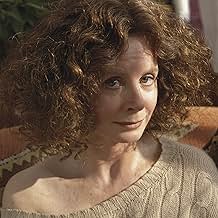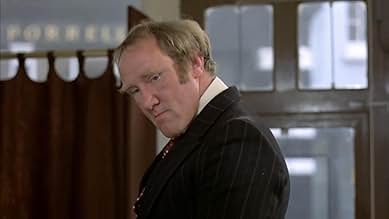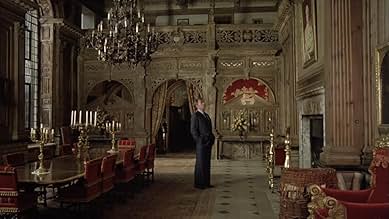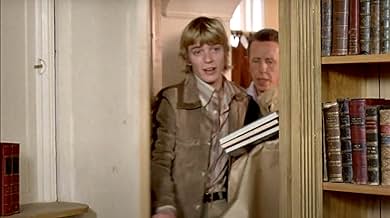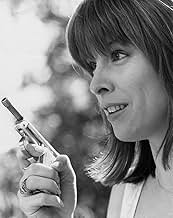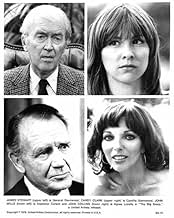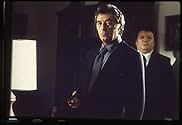A grizzled American private detective in England investigates a complicated case of blackmail-turned-murder involving a rich but honest elderly general, his two loose socialite daughters, a ... Read allA grizzled American private detective in England investigates a complicated case of blackmail-turned-murder involving a rich but honest elderly general, his two loose socialite daughters, a pornographer, and a gangster.A grizzled American private detective in England investigates a complicated case of blackmail-turned-murder involving a rich but honest elderly general, his two loose socialite daughters, a pornographer, and a gangster.
- Director
- Writers
- Stars
- Karl Lundgren
- (as Simon Turner)
- Director
- Writers
- All cast & crew
- Production, box office & more at IMDbPro
Featured reviews
It came as a surprise to me that Michael Winner was the director for the film. A man I associate with expensive dinners at expensive restaurants. But after watching this, and Death Wish, I have a new-found respect for eating in style. This film is not a Peckinpah, but it still manages to be incredibly effective in it's delivery. I like the car Mitchum drives too, a Mercedes soft-top.
The video is in widescreen by the way, requiring a screen re-adjustment or it'll look silly. Great performances from all of the actors and a superbly enjoyable plot in a film that has aged very well.
Some people criticised this film for being in the English countryside and that it doesn't bear up with the film noir style. I disagree, film noir is not limited to shady city streets, as this film goes to show.
First of all, the plot stays true to the novel, whereas the older version had a plot ruined by the restrictions of the Hayes code, so that it contains numerous loose ends and unexplained developments.
Secondly, Robert Mitchum impersonates Marlowe much better that Humphrey Bogart. Bogart essentially recycles his role of Sam Spade in "The Maltese Falcon". Yet, Spade and Marlowe are very different characters. While Spade is a cynic who just barely remembers the remnants of morality (and Bogart is brilliant in that role), Marlowe is way beyond that point. He walks around people in a distanced, almost detached way. Only when he spots a glimpse of humanity in his fellow men, he is willing to engage himself (as with General Sternwood in "The Big Sleep"). Mitchum plays this character with great understatement, as it should be done, while Bogart makes Marlowe just another hard-boiled detective, which could be replaced by any other one.
Finally, both Sarah Miles and Candy Clark (while not being necessarily great actresses) bring over the lunacy of the Sternwood daughters beautifully. While the scenes between Bacall and Bogart a great, they are out of place in this plot, in which there is no place left for romance. It might have been appropriate for the characters of Marlowe and Linda Loring in "The Long Goodbye", but hardly in a movie adaption of a novel, in which Marlowe remarks "both Sternwood women were giving him hell".
So, while this movie transfers the plot to another time and another place, it is a much better adaption of the novel than the version often regarded as a classic.
Winner treats this material with quite a bit of humor, rendering it positively silly on a frequent basis. It makes one believe that he had contempt for it. But Chandlers' story is fortunately still engrossing, and it's the kind of thing that really keeps viewers on their toes, trying to pay attention to all the details and twists. (Since there's much exposition to digest, viewers can't afford to let their attention wander.) The film *looks* absolutely great, with fine use of locations and lovely photography. It's spiced up with some (tastefully done) nudity, but it's never ever very violent.
The main draw is a sterling group of American and British actors. Sarah Miles, Richard Boone, Joan Collins, Edward Fox, John Mills, Oliver Reed (typically amusing as a threatening gangster / casino owner), Harry Andrews, Colin Blakely, Richard Todd, Diana Quick, and James Donald are all present and accounted for. Mitchum anchors the proceedings with his colorful performance, but dragging things down quite a bit is the way overdone airhead shtick by Candy Clark, playing Sternwoods' younger daughter. Usually she's pretty reliable, but here she's much too annoying. Mitchum and company do have fun with the sometimes witty and lively dialogue.
Well paced, and fairly energetic, but overall not especially memorable. Some people might want to just revisit the Bogie and Bacall version instead.
Six out of 10.
And that's what makes it so difficult to transfer his works to the screen. You almost have to have a voice-over from Philip Marlowe otherwise you not only get lost in the various plot twists but you miss the adamantly low-brow tropes -- "her hair was the color of gold in old paintings," or, "she threw me a glance I could feel in my hip pocket." "Chinatown," set in 1937 LA, was released to great critical and public acclaim in 1974. The very next year, Robert Mitchum tackled Philip Marlowe in "Farewell, My Lovely" and he was great, and so was the production, even if it was not the masterpiece that "Chinatown" was. Nobody will ever make a masterpiece out of a Chandler story because, after all, a masterpiece usually starts out with a coherent plot.
So the trick is to capture on screen what Chandler's prose evokes on the written page. Style is everything. "Farewell My Lovely" had it. "The Big Sleep," alas, doesn't. The director hasn't really done much to help things. In the 1946 version of "The Big Sleep," Howard Hawks at least had some fun with the characters. (Bogart and the horn-rimmed glasses in the book shop.) Hawks also allowed some humor in the dialog. ("She tried to sit in my lap while I was standing up.") Philip Marlowe with his resolutely seedy presence belongs in the marginal zone of Los Angeles, not in the uptrodden neighborhoods of London. He belongs in a trench coat, wearing an older fedora, not in the powder blue suits of Saville Row. ("I own a hat and a coat and a gun," he tells Nulty in "Farewell My Lovely," "and everything I touch turns to s***.") In this film we have to put up with a confident and compassionate Marlowe, striding through the fancy decor instead of slouching, never touching a drop of alcohol. And Mitchum doesn't add much to the story besides his usual heft. As James Agee once said of him, his casual languor suggests Bing Crosby supersaturated on barbiturates.
That reminds me. I couldn't help wondering, while I watched this, how much booze had gone into the production. I forget whether Chandler had quit drinking by the time he wrote this, but Mitchum himself was hardly an amateur. Olivier had kicked Cyril Cusack out of the Old Vic for showing up drunk for a performance of "Doctor's Dilemma" and reciting lines from another of Shaw's plays. Richard Boone was evidently immobilized during his last few years and Oliver Reed died of drink.
Still, look at the actors in this thing. In support are Edward Fox, Harry Andrews, James Donald, Colin Blakely, James Stewart, and Richard Todd. And all of them are up to the task, true professionals, with not a hollow note struck. I'm tempted to call the cast "peerless" but I don't know if it's permitted if there's a theatrical knight among them. Richard Boone is outstanding as Canino -- a villainous wreck, hobbling about on a broken foot, cackling over his own sliminess, howling with unrestrained glee as he watches a harmless little man whom he has just poisoned crash through a glass door and die.
Also notable are the locations and the art direction. It may not be sleazy Los Angeles in 1941 but London and its interiors look just fine. London has never looked less grimy. There is no rain or fog, the streets are clean, narrow and lined with classy book shops, and people tend to drive new and expensive cars.
Well, the movie is done with dash and style, no doubt about that. But it's the wrong style. Marlowe belongs in the 1940s. In the 1940s pornography and dope could get you serious jail time -- just ask Mitchum.
I didn't much care for it the first time I saw this. The second time was easier going because I'd lowered the bar of my expectation.
Did you know
- TriviaJames Stewart had difficulty saying his lines on time due to hearing and possibly memory problems. Some of the cast were shocked by his aged appearance. Robert Mitchum recalled, "The picture was all about corpses, but Jimmy looked deader than any of them." Stewart actually outlived Mitchum by one day, nearly 20 years later.
- GoofsWhen Marlowe takes the gun from Camilla after she unloads it on him with multiple blank rounds, he grabs the barrel with his bare hands. That should have proved to be very painful as the barrel would be extremely hot.
EDIT: This is incorrect. Blank cartridges in a small calibre gun will not heat the barrel to any great extent. A gun barrel gets hot mainly due to the friction of the bullet going through the barrel, not from the powder in the cartridge.
- Quotes
Charlotte Sternwood: [when Marlowe declines to blackmail her] Wha-? You don't want money?
Philip Marlowe: Oh sure. All I itch for is money. I'm so greedy that for fifty pounds a day plus expenses on the day I work, I risk my future, the hatred of the cops, of Eddie Mars and his pals, I dodge bullets and put up with slaps and say "Thank you very much. If you have any further trouble please call me: I'll just put my card here on the table." I do all that for a few pounds. And maybe just a little bit to protect what little pride a sick and broken old man has in his family, so that he can believe his blood is not poisoned. That his little girls - though they may be a trifle wild - are not perverts and killers.
- ConnectionsFeatured in James Stewart, Robert Mitchum: The Two Faces of America (2017)
Details
- Release date
- Countries of origin
- Language
- Also known as
- Tote schlafen besser
- Filming locations
- Knebworth House, Knebworth, Hertfordshire, England, UK(Sternwood Mansion)
- Production companies
- See more company credits at IMDbPro
Box office
- Budget
- £3,000,000 (estimated)


